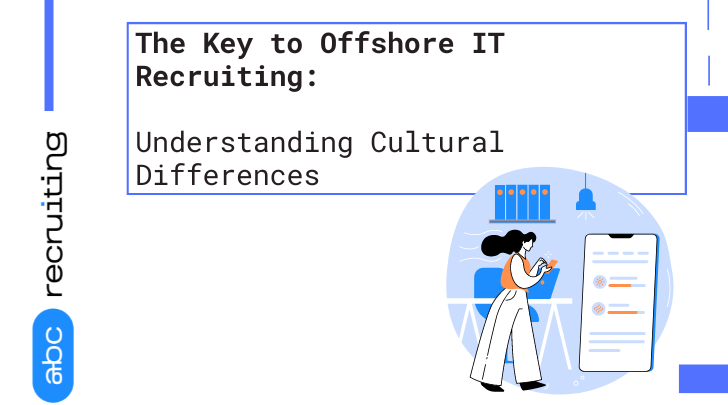Access to skilled, affordable talent abroad is one of the biggest benefits of offshore recruiting. But before you dive into interviews with candidates from India or Eastern Europe, you need to understand one key thing: cultural and work style differences. If you go into the process assuming everyone thinks like your team back home, you'll face challenges.
The norms around communication, workplace hierarchy, decision making, and more can vary widely between countries and regions. If you're not prepared, these differences can lead to miscommunications, frustrations, and ultimately a poor hiring experience. The solution? Do your homework. Talk to others with experience recruiting abroad. Learn about cultural attitudes that may differ from your own. And keep an open mind - different isn't necessarily wrong.
With the right approach, you can find amazing talent offshore. But first, recognize that the key to success is understanding cultural differences. Only then will you be able to find the right fit for your team, no matter where in the world they might be.
Cultural Values Shape Work Styles: Individualism vs. Collectivism
When it comes to offshore IT recruiting, understanding cultural differences is crucial. One significant factor to consider is the distinction between individualism and collectivism. In individualistic cultures, such as the United States, there is a strong emphasis on independence and personal accomplishments. People value individual freedom and autonomy.
On the other hand, in collectivist cultures like those found in Eastern Europe, there is a greater emphasis on group cohesion and loyalty. Community harmony, family ties, and collective goals are highly valued. Collaboration and maintaining social harmony are important aspects of these cultures.
Recognizing these cultural differences is essential when engaging in offshore IT recruiting, as it helps establish effective communication, teamwork, and collaboration with professionals from Eastern European countries. By acknowledging and respecting the cultural orientations of individualism and collectivism, recruiters can foster positive working relationships and leverage the strengths of each cultural context.
Candidates from collectivist cultures may emphasize teamwork, collaboration and group success in interviews. They may ask more about company culture and growth opportunities. Candidates from individualist cultures may focus more on career progression, compensation, and the chance to achieve.
These differences also shape work styles. In collectivist cultures, junior members are expected to defer to senior colleagues. Questioning managers openly could be seen as disrespectful. In contrast, individualist cultures encourage voicing your opinion, thinking outside the box and open debate.
When managing an offshore team, understanding these dynamics is key. Provide clear direction and feedback, as collectivist employees will want to please managers. But also give opportunities for input and acknowledge individual contributions, as this motivates those from individualist cultures.
With awareness and the right management approach, cultural differences can become an advantage. A mix of values on your team leads to more creativity and better problem solving. The key is recognizing how culture influences work styles and motivations, then leveraging these differences to benefit your company. By doing so, you'll build an innovative, high-performing global team.
Communication Styles Differ: Direct vs. Indirect

When it comes to communication, cultural differences can really impact the outcome. For offshore IT recruiting, understanding these differences is key.
In some cultures, communication is very direct. People say exactly what they mean in a straightforward way. However, in other cultures, communication tends to be more indirect. The meaning is implied or hinted at, rather than stated outright.
For example, if you ask an IT candidate from a direct culture how long a project will take, they may give you a concrete timeline. Someone from an indirect culture, however, may say something like “It will be done when it’s done” to avoid committing to a deadline they can’t guarantee. They don't want to disappoint you or lose face.
As another example, people from indirect cultures may avoid saying “no” directly. Instead of refusing a request outright, they may say something like “We’ll have to see” or “That may be difficult.” It’s a way of politely declining without being confrontational.
When recruiting offshore, understand these differences in communication style. Look for the implied meaning and read between the lines. Ask follow up questions to confirm details. And avoid frustration by not taking indirect communication personally. With cultural insight, you’ll build better relationships and find the best IT talent, no matter where in the world they are.
Offshore IT Recruiting FAQs: Common Questions Around Cultural Barriers
Offshore IT recruiting comes with its fair share of questions, especially around navigating cultural differences. Here are some of the most frequently asked questions companies have when recruiting offshore talent.
How do I effectively communicate across cultures?
Focus on listening, be respectful, and check for understanding. Use simple language, avoid idioms and slang. Provide context and clarity in your requests. Be flexible in your communication preferences - some cultures prefer phone or video, others favor written communication. Respect cultural holidays and work schedules. Treat your offshore team members the way you would want to be treated.
What are some common challenges in managing an offshore team?
Time zone differences, geographic separation, and lack of in-person interaction can pose difficulties. Set clear expectations, document everything, over-communicate and be highly available. Cultural miscommunications may also arise, so educate yourself on cultural differences and encourage open dialog. Performance management requires extra effort, as does keeping offshore teams engaged and motivated from afar. But with the right approach, these challenges can be overcome.
How can I set my offshore team up for success?
Invest in learning about cultural differences. Provide thorough onboarding and training. Set clear goals and key performance indicators. Use collaboration tools to stay in close contact. Give regular feedback and recognition. Make an effort to build rapport and trust. Respect their expertise and value their input. Offshore talent can be a major asset if you make their success and satisfaction a priority.
Unlocking Offshore IT Recruiting Success
So there you have it, the keys to successful offshore IT recruiting. Take the time to understand how cultural differences and work styles can impact your ability to find and hire the right talent. Learn about communication preferences, views on hierarchy and decision making, concepts of time, and approaches to work-life balance. The more you understand what makes candidates tick in their native environment, the better equipped you'll be to evaluate their fit for your team and company culture. While recruiting across borders can be challenging, the rewards of accessing an expanded talent pool and diverse perspectives can be huge.
With patience, cultural awareness, and the right onboarding process, you'll be well on your way to building an innovative, global workforce. The world is getting smaller every day, so start now and you'll have a competitive advantage for the future. What are you waiting for? The top tech talent could be just a cultural lesson away.




